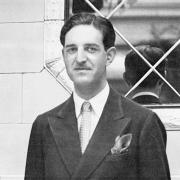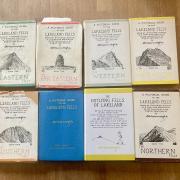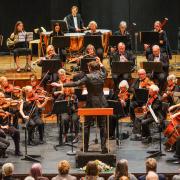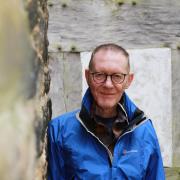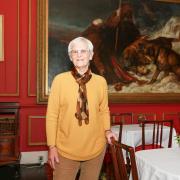With the 75th anniversary of VE Day this month, Bolton Air Training Corps president George Davies recalls his 40 year career in the RAF and the role he played in sorties over Germany.

If young George Davies had had his way he would have been a sea captain but Fate threw him instead into the hands of the Royal Air Force and the war from above. Today, at his home in Bolton, he is surrounded by photos, certificates and commendations of a fascinating life in the RAF that eventually spanned 40 years.
At 97, his mind is clear and precise. He can recall the specific days and even the feelings of all those years ago and traces with clarity and candour how a generation of young men took to the skies to face the might of the Nazis.
Born in Peckham, south east London, George lived with his parents and brother Ronald. His father had been injured in World War One by an exploding shell ‘but he never talked about it much, so I didn’t really know about war,’ says George.
What George did know was that he wanted a career at sea, leading to him becoming a ship’s captain. So, as a young teenager, he enrolled at the London School of Navigation where he studied for three and a half years.

Unfortunately, the rise of Adolf Hitler brought that to a halt when war was declared in 1939 and the then 17-year-old George and his friend tried to enlist.
‘They realised I was too young and needed to wait until I was 18,’ recalls George. ‘But they were very interested in my navigation studies. I was certainly surprised when they said these would be very useful to the RAF because I thought I’d be going to sea! Even then I thought I would be a ground gunner and shooting down Germans.’
During 1940 and 1941, the Blitz began and George’s home was bombed out. He had watched the Nazi planes coming up the Thames on bombing raids and wanted to do something to help. So, aged 18, he started his RAF training in November 1941.
Bomber Command had been created in 1936 and comprised the RAF’s light and heavy bomber squadrons. In 1939, this modest force – 23 operational bomber squadrons with 280 aircraft – allowed Britain to immediately strike back at Nazi Germany but only against military targets and in daylight.

This gradually changed as early raids against warships and airfields made bomber aircraft easy targets for enemy fighters and losses were heavy. In 1940, after Hitler’s invasion of France, the RAF began a night-time bombing campaign against German industry.
By 1941, navigation over blacked-out Europe was a major problem but by the following year, Bomber Command had new aircraft – the Avro Lancaster – and a new leader in Air Chief Marshal Sir Arthur Harris. The targeting of whole cities to destroy both factories and their workers was judged necessary to defeat an enemy that seemed on the brink of victory.
Meanwhile, George found himself in South Africa, in the sky and in Wellington Bombers learning how to become a vital member of a small airborne team. The navigator, or observer, was responsible for keeping the aircraft on course at all times, reaching the target and then the home base.
Once trained and back in the UK, he joined 630 Squadron at East Kirkby just outside Skegness and in October 1943 was posted to Lincolnshire. In the December, he undertook his first bombing raid. ‘We thought it would be to a minor place but it was actually Berlin,’ he says.
He was 19. All the Lancaster’s crew were around the same age; the pilot was the oldest at 20. This was George’s first sortie but, he adds: ‘There was no time to be scared because we had a job to do.’
The problem with night-time vision was largely solved by an elite Pathfinder Force which guided the bombers using coloured marker flares. Major attacks were launched against Germany’s industrial heartland in the Ruhr Valley.
His crew flew bombing raids, often lasting up to seven hours at a time, two to three times a week. Amazingly, George – who flew 30 missions – emerged unscathed, but many colleagues died. Average life expectancy for bomber crews was measured in weeks and half of all British aircrew were killed on operations.
George later received medals including the Distinguished Flying Medal, for exceptional valour, courage or devotion to duty while flying in active operations against the enemy. He flew on bombing missions to all parts of Germany and France with every sortie recorded meticulously in a book he still has.
When the end of the war was declared in 1945, George was on leave and in a pub near his home. ‘We were all so delighted,’ he remembers. ‘People were out in the streets – it was such a relief.’
George, by then highly trained and with experience in all sorts of aircraft, had already spent some time as an instructor during the war. He continued flying and took part in more missions including in the Far East.
After the war, he became an instructor and was based at RAF Conningsby – flying every type of plane from B29s and Brittanias to flying boats. He married his sweetheart Connie and continued in the RAF as a careers’ officer. After being based in central Manchester, he set up an RAF careers’ office in Bolton town centre.
The couple and their two children moved to the town in 1972 and George became involved with the local Air Training Corps, starting a band and becoming the squadron’s chairman then president. He is a great favourite with the young people there and, as Adjutant Sue Taylor says: ‘He’s the squadron’s pride and joy.’
His experiences of life as a young man in wartime continue to fascinate new generations, amazed that volunteers put their lives on the line every day for their country, but George tells them, it’s just what so many people did.
Although the Imperial War Museum North at Media City in Salford is now closed, they have lots of information, images and stories online.
Go to iwm.org.uk/victory.












